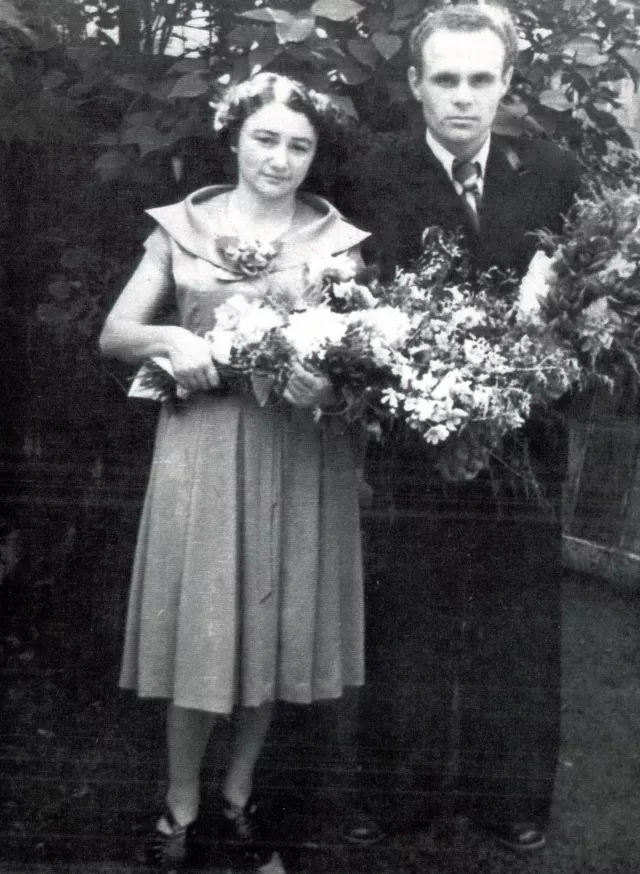Anna Ivankovitser and her husband Natan Gornshtein
My husband Natan Gornshtein and I as newlyweds. The photo was taken in Chernovtsy in 1956.
Natan was a Jew born in Odessa in 1926. With his fair hair and gray eyes he didn't look like a Jew. He was the only child in his family. His father, Boruch Gorshtein, and his mother Hana were very kind, intelligent people. They accepted me as their daughter from the very first day they met me. After Natan left Odessa they moved to Kotovsk in the suburbs of Odessa. Natan's parents were not religious. They only celebrated Pesach as a tribute to tradition. They spoke Russian in the family. Natan's mother was a housewife. His father was chief accountant at the Mill Factory. He was a very decent man. His wife said that he was out of this world. Other people might become millionaires holding his position, but he only received a modest salary. They lived a modest life. They loved each other very much. My father-in-law called his wife Hanochka and she addressed him as Buzinka. We often visited them and they visited us. Natan's parents were very dear to me. His father died in 1969. His mother refused to move in with us. She died in 1970. Both of them were buried in the same grave in the Jewish section of the town cemetery.
Natan graduated from the Railroad College and got a job assignment at the railcar depot in Chernovtsy. His mother's sister was living here. For a few years, Natan served in the army in the Far East, where people had no idea about what Jews were like. He never heard Yiddish and when he came to Chernovtsy he was surprised to hear Yiddish spoken in the street. Out of about about 150,000 people in Chernovtsy, 60% were Jews. He liked it so much there that he requested to be sent to Chernovtsy after finishing college. The reason he gave was that he had a fiancée in Chernovtsy. His words proved true. I had a friend who lived in the same building as his aunt. Once, his aunt mentioned to my friend that her nephew was visiting her and that it would be good if he met a nice girl. This friend of mine introduced us to each other in March. We courted for half a year and got married in September. His mother's name was Hana, the same as mine. Somebody told her that it was against Jewish tradition for a mother-in-law and a daughter-in-law to have the same name. She said: 'My son wants to marry her. And if something bad were to happen, let it happen to me.' We didn't have a Jewish wedding. Mama made dinner for the family and close friends. My husband moved in with us. Mama and I spoke Yiddish, and he learned the language during those years. Some time later he entered the University of Railroad Transport Engineers.
Our elder daughter Polina was born in 1957. Marina, our younger daughter, was born in 1964. We continued celebrating the Jewish holidays in our family. We celebrated Pesach according to the tradition. We bought matzah, made stuffed fish and baked cakes. My daughter Polina cooks this traditional food now. My husband came to like these holidays. I have fasted at Yom Kippur since I was 11, and Natan joined me. Polina speaks Yiddish and Hebrew. As for Marina, I don't think she knew any Hebrew before she left. We also celebrated Soviet holidays. We enjoyed cooking a nice dinner for the family and having guests. We didn't care much about the meaning of these holidays.


















